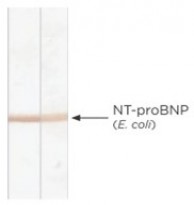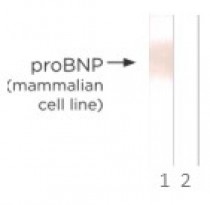ARG10408
anti-NT-proBNP antibody [15F11]
anti-NT-proBNP antibody [15F11] for ELISA,Western blot and Human
Cell Biology and Cellular Response antibody; Signaling Transduction antibody
Overview
| Product Description | Mouse Monoclonal antibody [15F11] recognizes NT-proBNP |
|---|---|
| Tested Reactivity | Hu |
| Tested Application | ELISA, WB |
| Host | Mouse |
| Clonality | Monoclonal |
| Clone | 15F11 |
| Isotype | IgG2b |
| Target Name | NT-proBNP |
| Antigen Species | Human |
| Immunogen | Synthetic N-terminal pro brain natriuretic peptide (NT-proBNP), corresponding to aa. 13-27 |
| Conjugation | Un-conjugated |
| Alternate Names | 4-27; Natriuretic peptides B; 1-28; 1-29; 5-32; BNP; 1-32; 1-30; BNP-32; 5-29; 2-31; 4-30; 4-31; 4-32; 3-29; Gamma-brain natriuretic peptide; 3-30; 5-31; 3-32; 4-29 |
Application Instructions
| Application Note | * The dilutions indicate recommended starting dilutions and the optimal dilutions or concentrations should be determined by the scientist. |
|---|
Properties
| Form | Liquid |
|---|---|
| Purification | Protein A affinity purified. |
| Buffer | PBS (pH 7.4) and 0.1% Sodium azide |
| Preservative | 0.1% Sodium azide |
| Concentration | 1.0-2.0 mg/ml |
| Storage Instruction | For continuous use, store undiluted antibody at 2-8°C for up to a week. For long-term storage, aliquot and store at -20°C or below. Storage in frost free freezers is not recommended. Avoid repeated freeze/thaw cycles. Suggest spin the vial prior to opening. The antibody solution should be gently mixed before use. |
| Note | For laboratory research only, not for drug, diagnostic or other use. |
Bioinformation
| Database Links | |
|---|---|
| Gene Symbol | NPPB |
| Gene Full Name | natriuretic peptide B |
| Background | This gene is a member of the natriuretic peptide family and encodes a secreted protein which functions as a cardiac hormone. The protein undergoes two cleavage events, one within the cell and a second after secretion into the blood. The protein's biological actions include natriuresis, diuresis, vasorelaxation, inhibition of renin and aldosterone secretion, and a key role in cardiovascular homeostasis. A high concentration of this protein in the bloodstream is indicative of heart failure. The protein also acts as an antimicrobial peptide with antibacterial and antifungal activity. Mutations in this gene have been associated with postmenopausal osteoporosis. [provided by RefSeq, Nov 2014] |
| Function | Cardiac hormone which may function as a paracrine antifibrotic factor in the heart. Also plays a key role in cardiovascular homeostasis through natriuresis, diuresis, vasorelaxation, and inhibition of renin and aldosterone secretion. Specifically binds and stimulates the cGMP production of the NPR1 receptor. Binds the clearance receptor NPR3. [UniProt] |
| Research Area | Cell Biology and Cellular Response antibody; Signaling Transduction antibody |
| Calculated MW | 15 kDa |
| PTM | The brain natriuretic peptide 32 form is cleaved at Pro-104 by the prolyl endopeptidase FAP (seprase) activity (in vitro). |
Images (2) Click the Picture to Zoom In
-
ARG10408 anti-NT-proBNP antibody [15F11] WB image
Western blot: Human recombinant NT-proBNP expressed in E. coli stained with 1) ARG10408 anti-NT-proBNP antibody [15F11] and 2) ARG10406 anti-NT-proBNP antibody [11D1], after Tricine-SDS gel electrophoresis.
-
ARG10408 anti-NT-proBNP antibody [15F11] WB image
Western blot: Human recombinant proBNP expressed in mammalian cells stained with 1) ARG10408 anti-NT-proBNP antibody [15F11] and 2) ARG10406 anti-NT-proBNP antibody [11D1], after Tricine-SDS gel electrophoresis.









